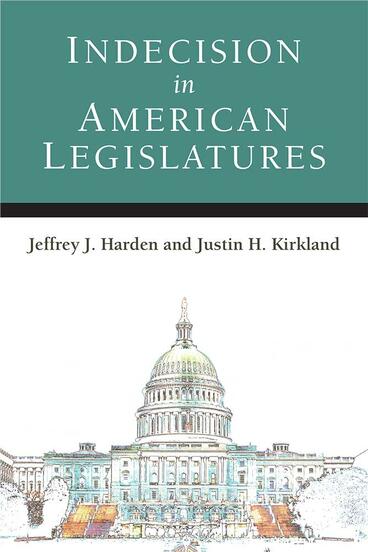Indecision in American Legislatures
Flip-flopping and its discontents
Description
Lawmaking provides many opportunities for proposals to be altered, amended, tabled, or stopped completely. The ideal legislator should assess evidence, update his or her beliefs with new information, and sometimes be willing to change course. In practice, however, lawmakers face criticism from the media, the public, and their colleagues for “flip-flopping.” Legislators may also only appear to change positions in some cases as a means of voting strategically.
This book presents a systematic examination of legislative indecision in American politics. This might occur via “waffling”—where a legislator cosponsors a bill, then votes against it at roll call. Or it might occur when a legislator votes one way on a bill, then switches her vote to the other side. In Indecision in American Legislatures, Jeffrey J. Harden and Justin H. Kirkland develop a theoretical framework to explain indecision itself, as well as the public’s attitudes toward indecision. They test their expectations with data sources from American state legislatures, the U.S. Congress, and survey questions administered to American citizens. Understanding legislative indecision from both the legislator and citizen perspectives is important for discussions about the quality of representation in American politics.
Jeffrey J. Harden is Associate Professor of Political Science and Concurrent Associate Professor of Applied and Computational Mathematics and Statistics at the University of Notre Dame.
Justin H. Kirkland is Associate Professor of Politics and Policy at the University of Virginia. He was previously at the University of Houston.
Reviews
“Harden and Kirkland develop a general theory of the conditions under which legislators change their positions on legislation and test it using an impressive array of different data sets and methodological approaches. Indecision in American Legislatures advances our understanding on the fundamental question of how lawmakers reach their voting decisions on bills by highlighting the cross-pressures they often face from party leaders and constituents.”
—Peverill Squire, University of Missouri
“Harden and Kirkland contribute their unique and thorough examination of legislator indecision—when legislators switch their official position on a bill. . . . This work fills a serious gap in our understanding of legislative behavior that paves the way for a more comprehensive theory of lawmakers’ voting decisions.”
—Diana Dwyre, California State University, Chico
“Harden and Kirkland rival any recent work on state legislatures. They successfully utilize roll call and sponsorship to advance our understanding of legislative decision-making. This book will become the standard for which all future work on legislative behavior builds.”
—Jonathan Winburn, University of Mississippi
"In Indecision in American Legislatures, Jeffrey Harden and Justin Kirkland make one of the first attempts to empirically evaluate waffling by
- Jacob R. Straus
examining newly collected data on voting in American state legislatures and the U.S. Congress." —Congress & the Presidency
"This book is a useful addition to a recent trend in legislative scholarship that views lawmakers as human beings who make decisions with limited time, incomplete information, and distorted perceptions of reality and under conflicting pressures. It also provides a lesson by example on how to construct and empirically evaluate a theory, and readers should pay careful attention to its research design and standards of evidence." —Political Science Quarterly
- Adam Cayton
"With such a wide variety of information, there is quite literally something for everyone interested in legislator indecision, no matter what level of information is desired. For researchers interested in the implications of indecision in American legislatures, Harden & Kirkland’s book is an amazing resource." —American Review of Politics
- Joe F. West

